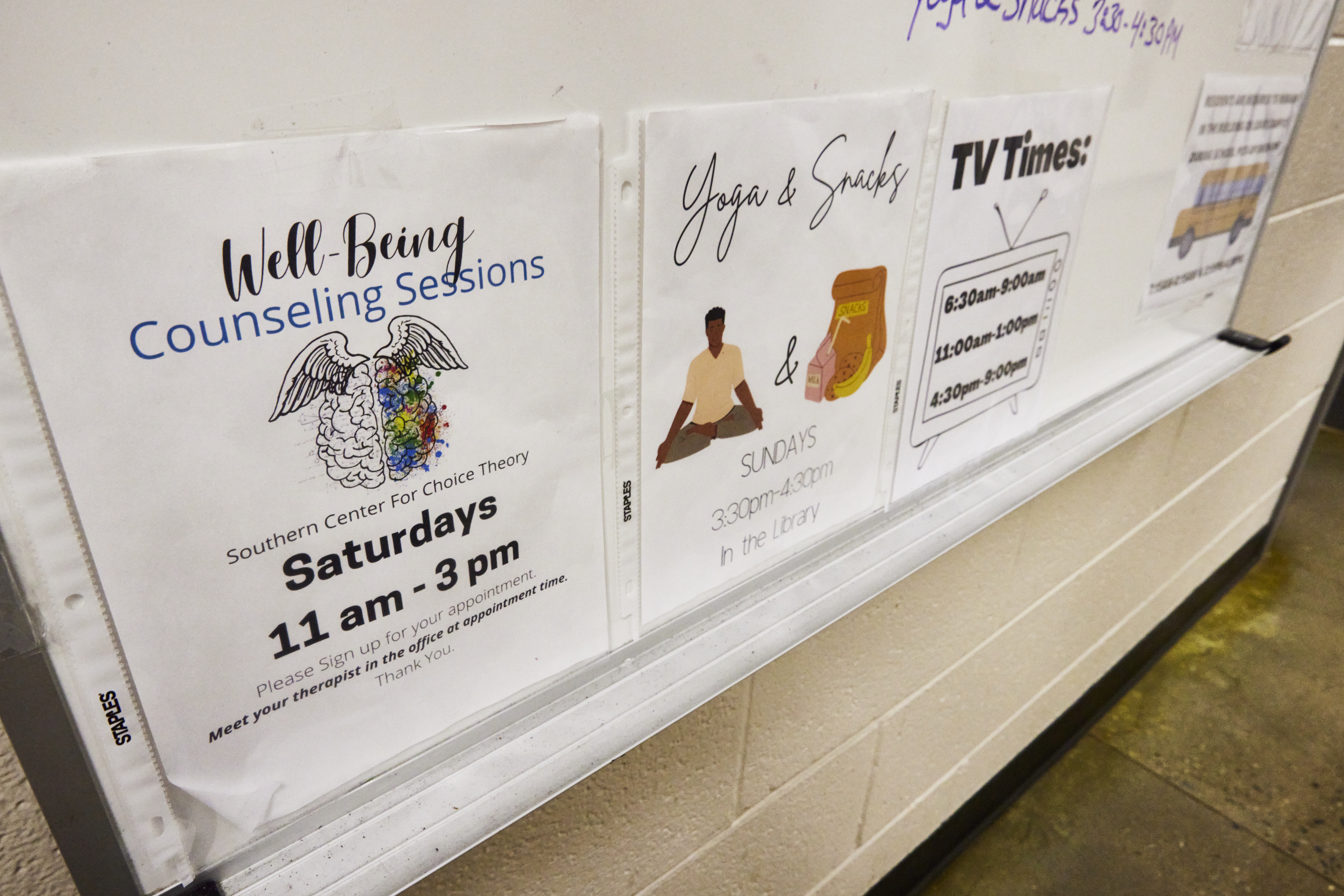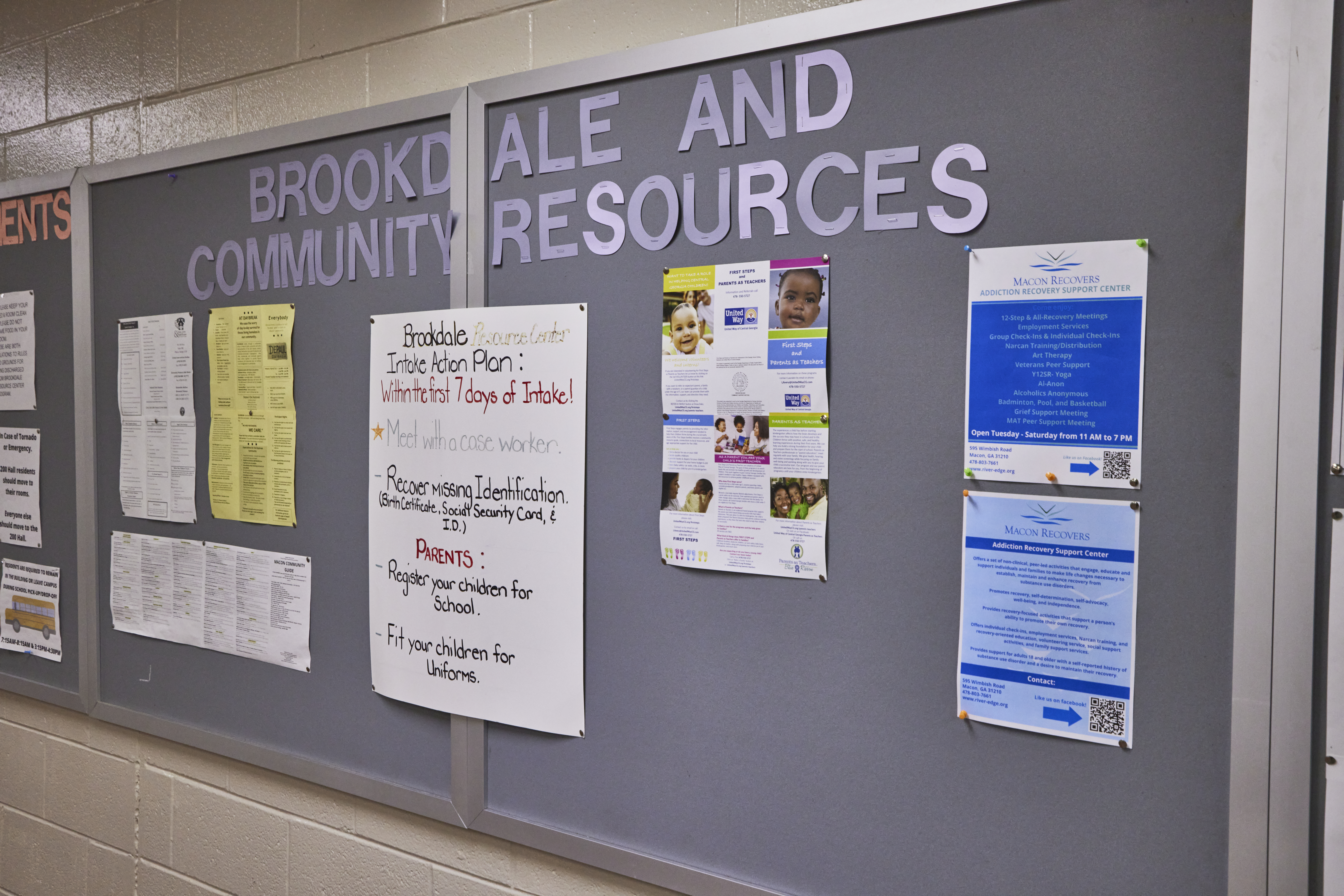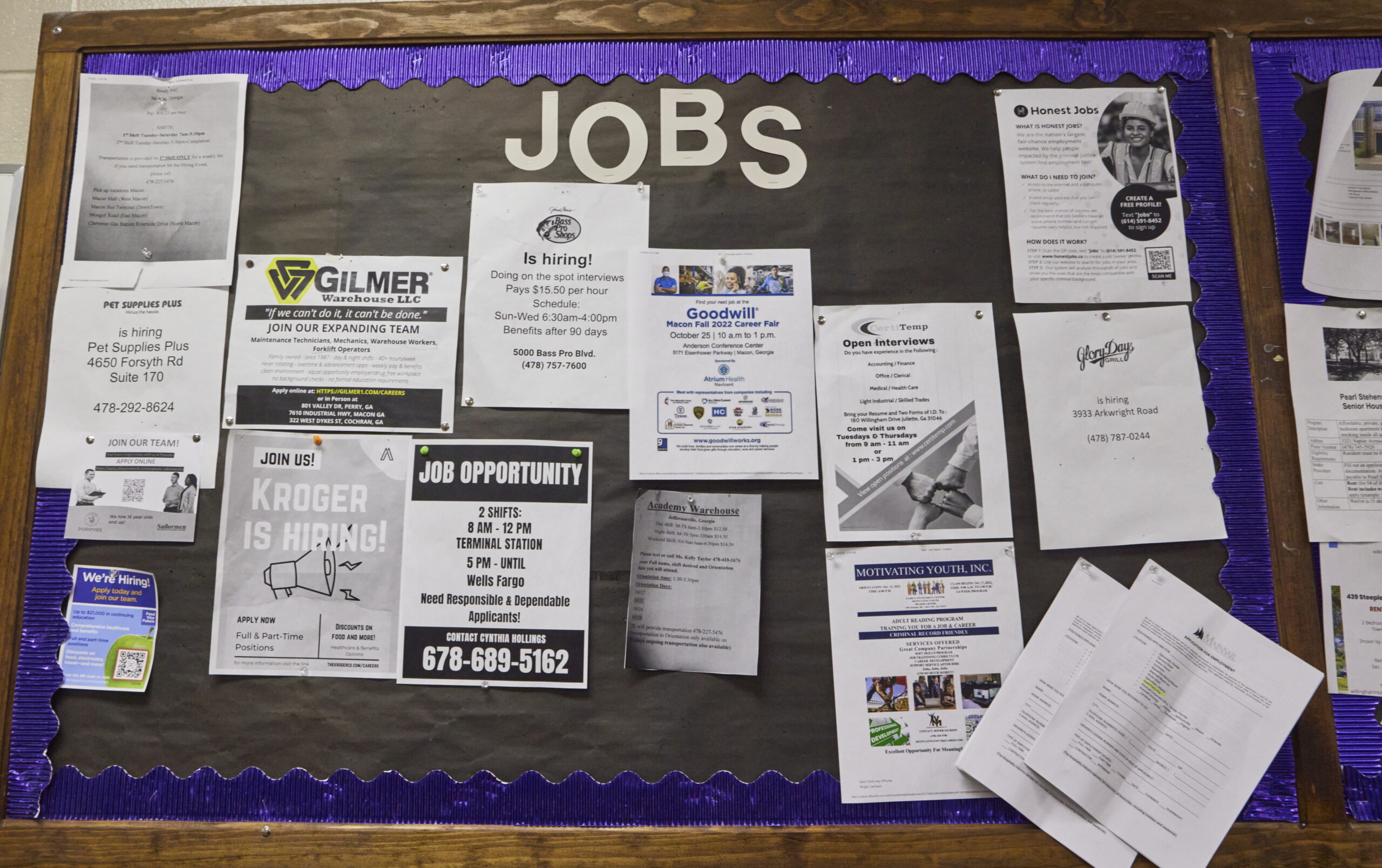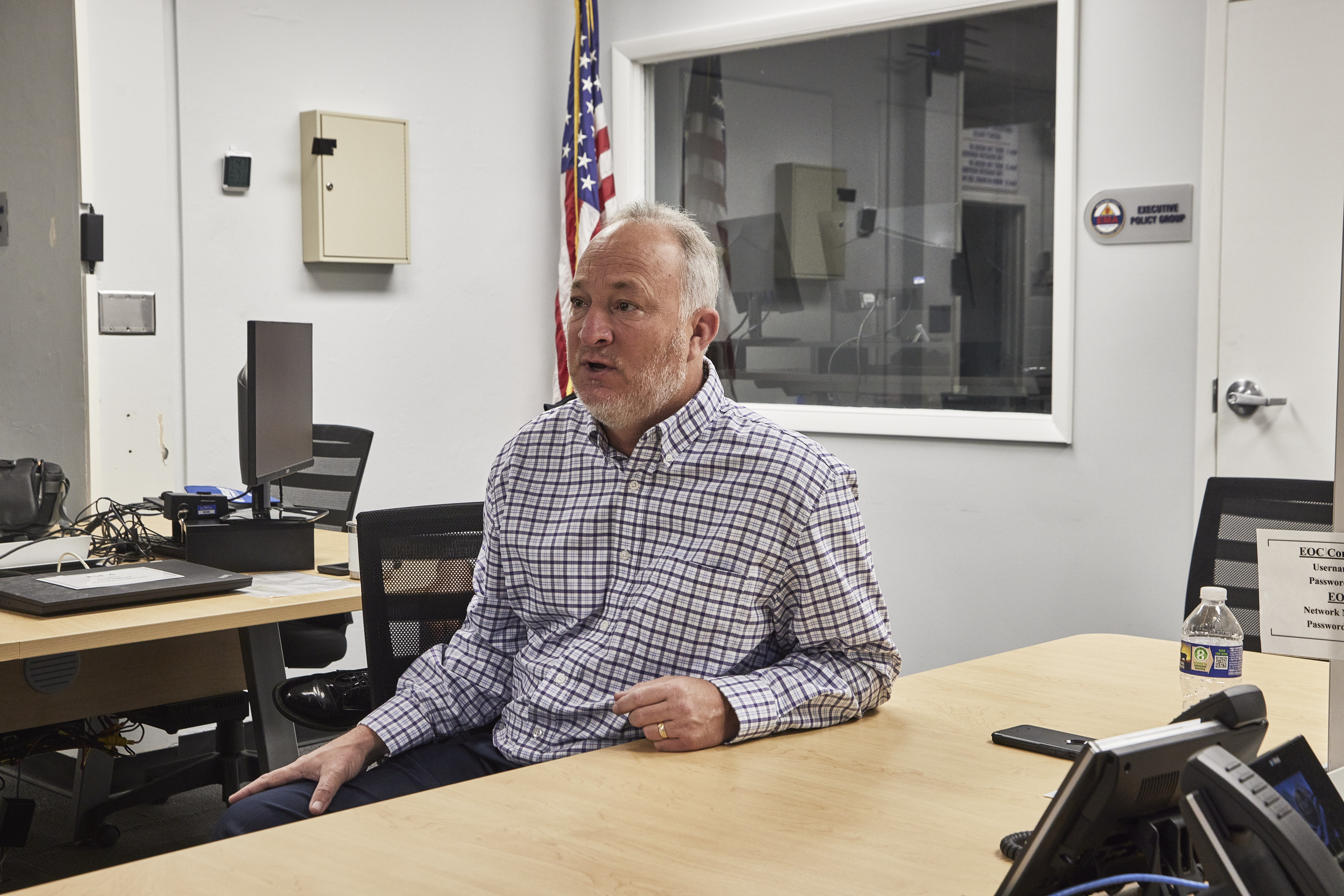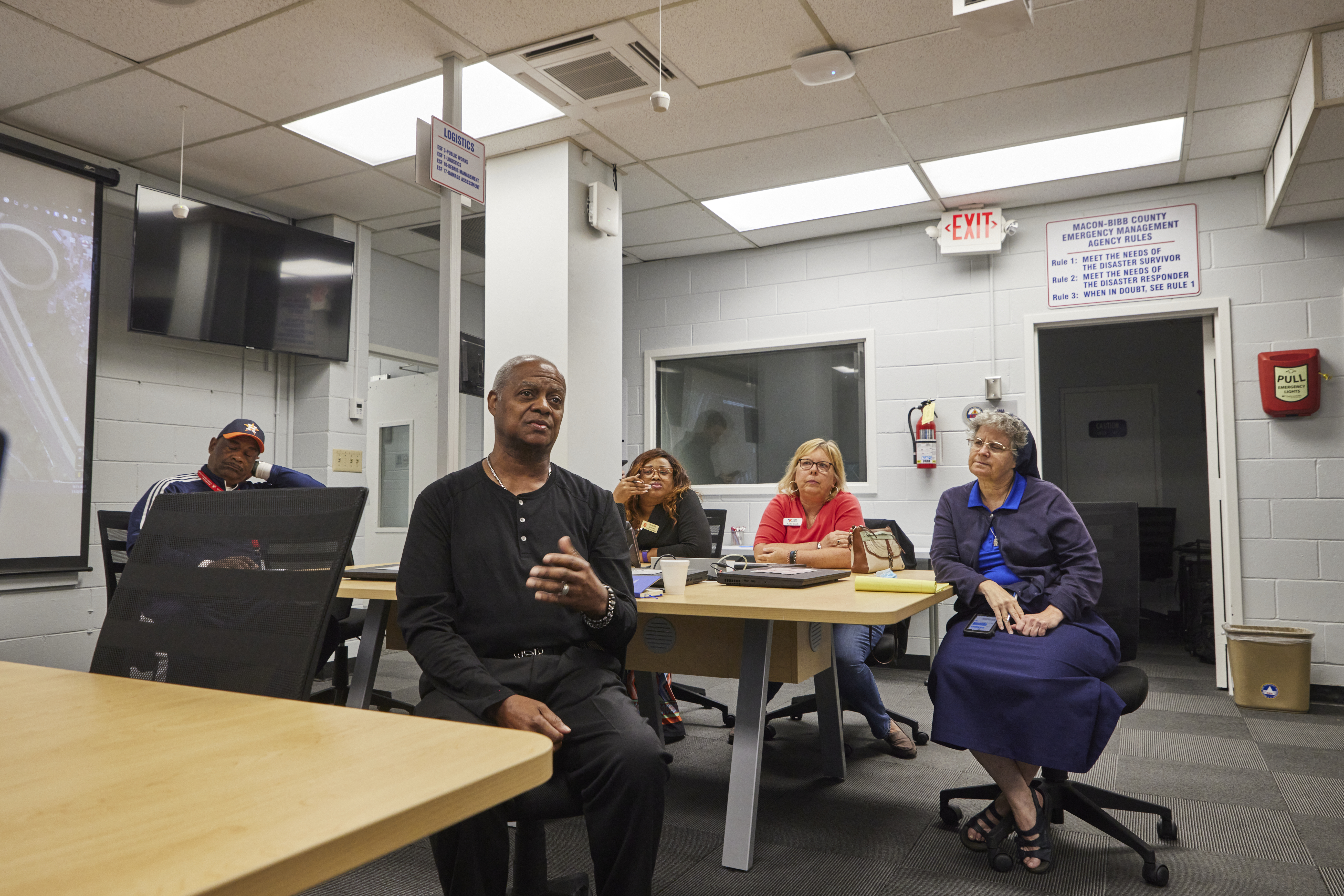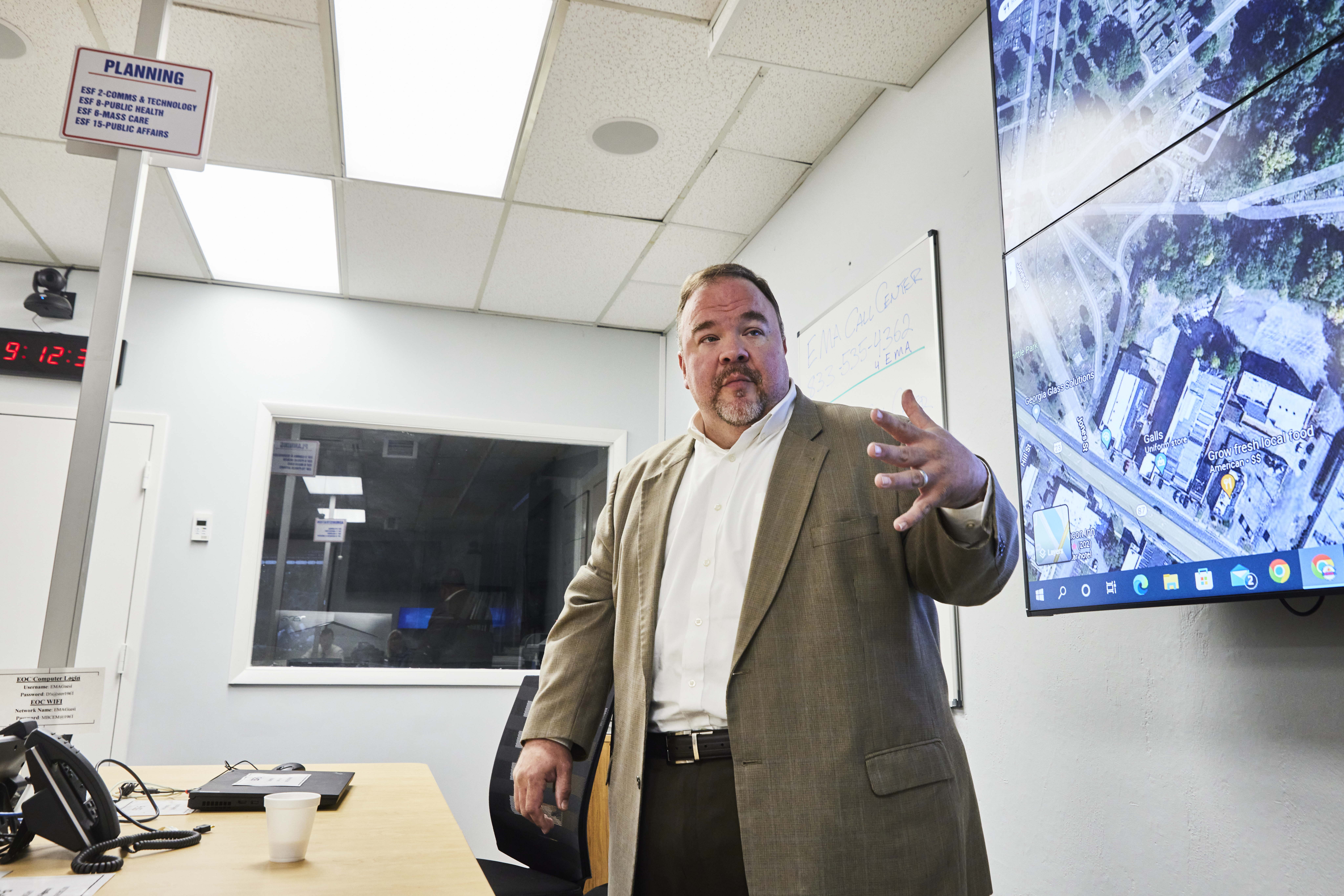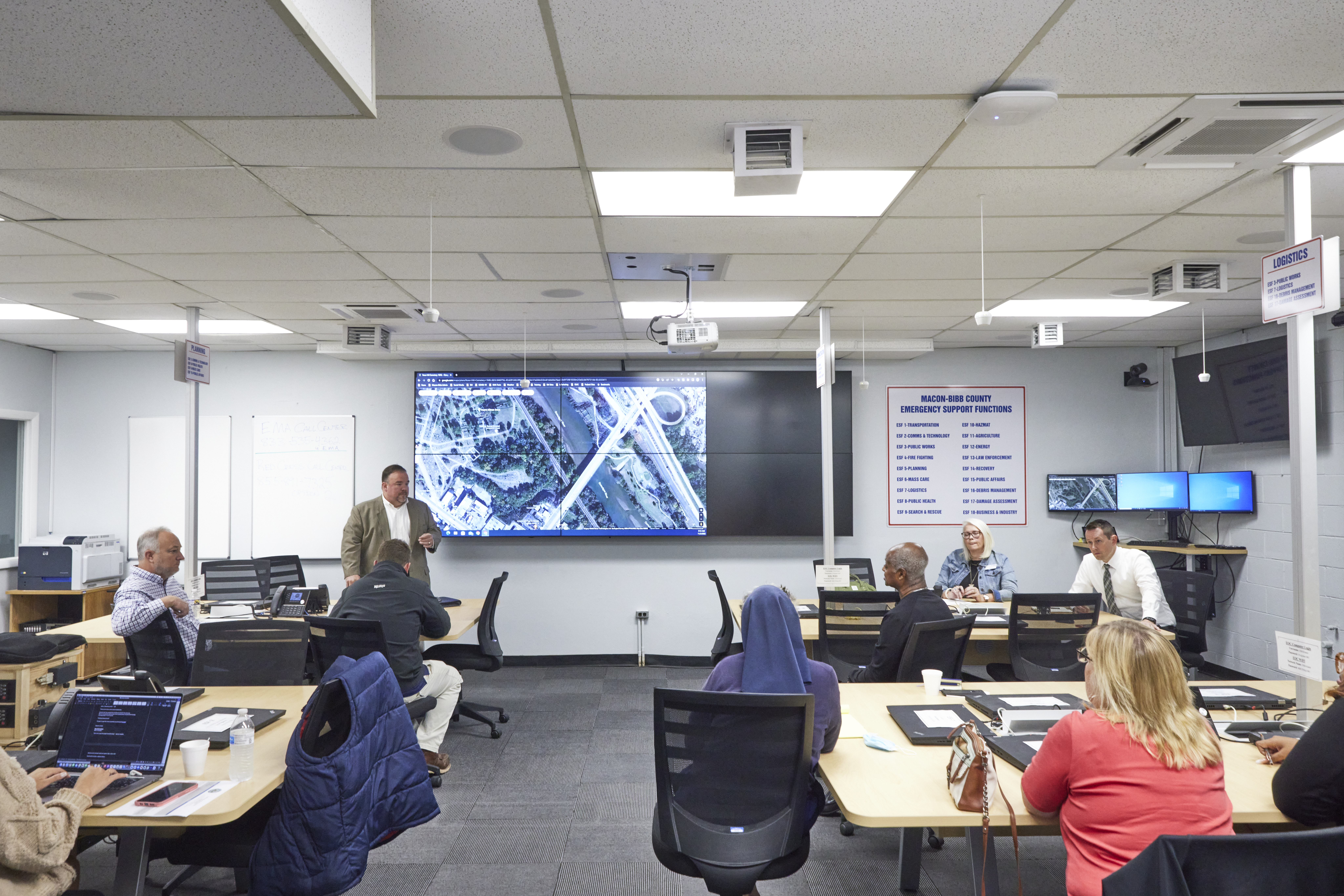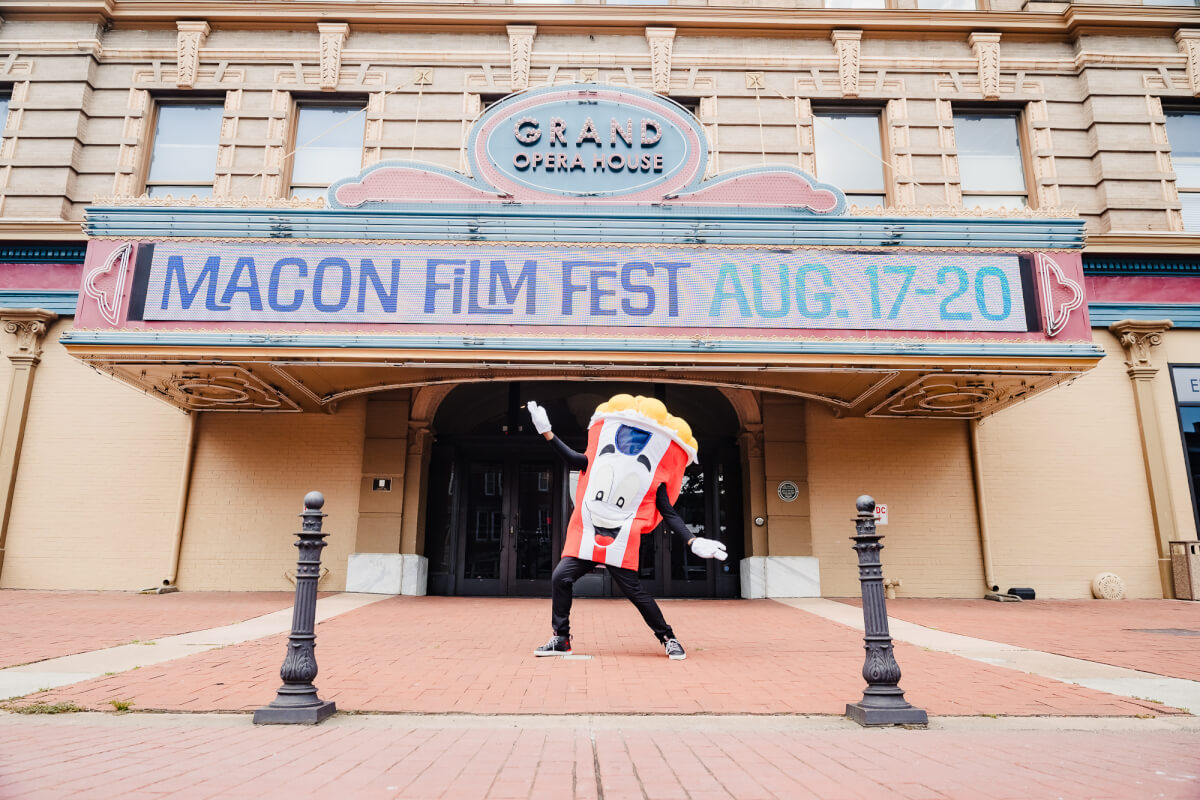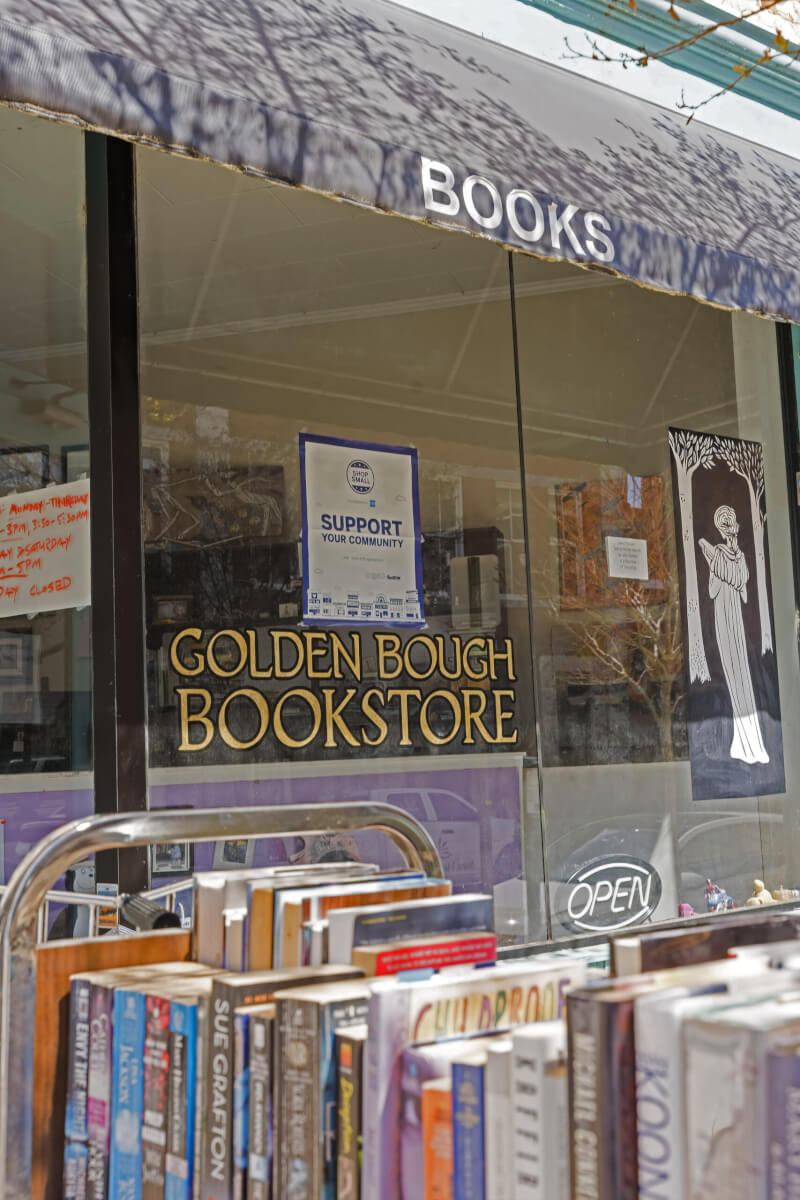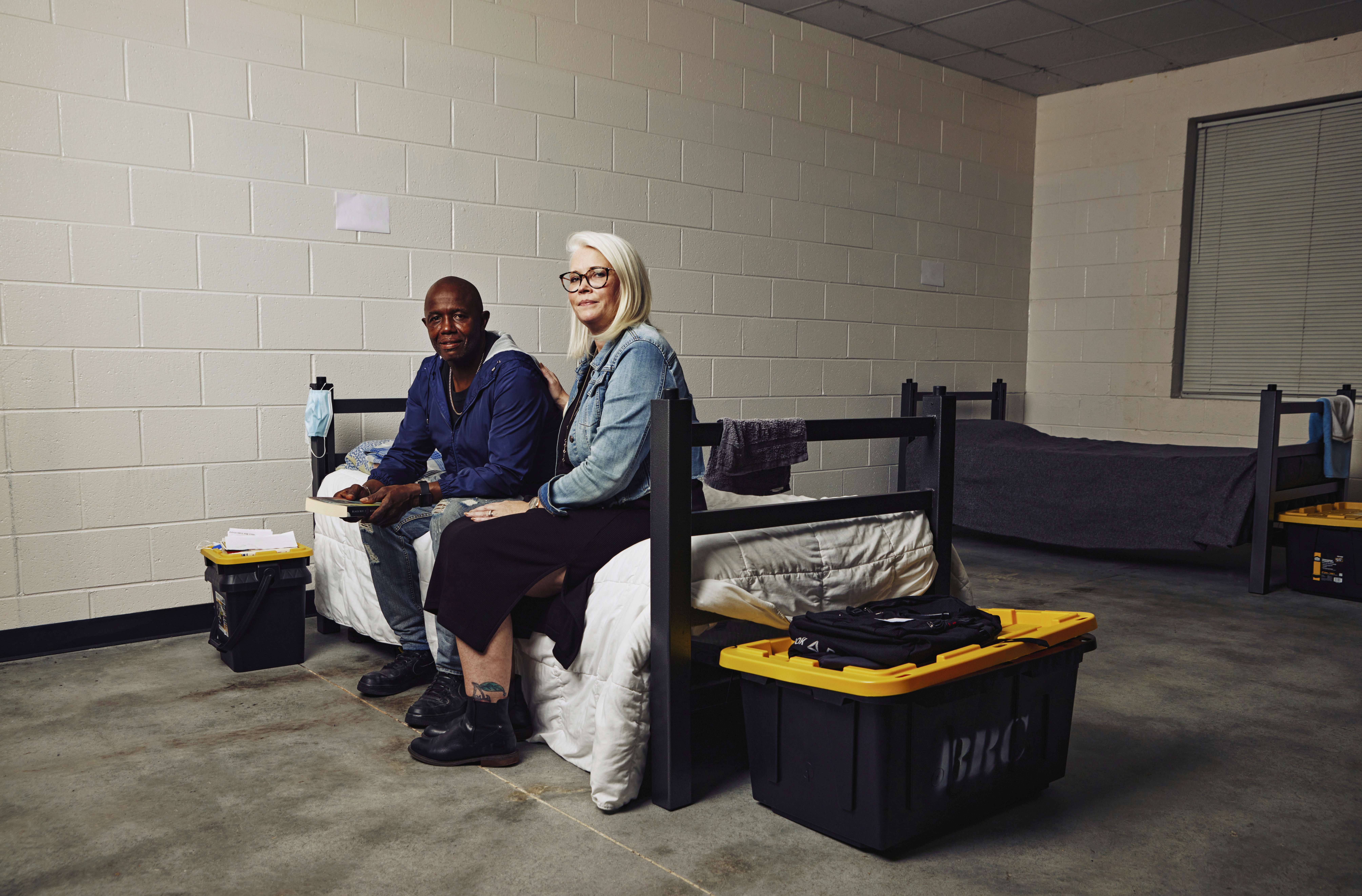
United to end homelessness
By Edna Ruiz
Photography by Matt Odom
Sleeping under the I-16 bridge near Spring Street in Macon is a thought that never crossed Ricky Veal’s mind until he had no choice but to do it. For five months, the 54-year-old from Wilkinson County slept to the sound of cars on the interstate roaring above him, sharing the space with strangers who were fighting their own battles. Becoming homeless wasn’t a choice for Veal — it just happened to him.
In 2009, Rheem Manufacturing Co. in Milledgeville closed its doors, leaving 1,200 people without a job. Veal was one of those people, even after dedicating 24 years of his life to the company as a machine operator. After that, he got a job at Mayfield Dairy Farms in Macon, which also closed shortly after the start of the pandemic, Veal said. Each time the companies closed, Veal took a hit but kept going, landing a job at Kumho Tire.
“I started having trouble with getting a ride from Wilkinson County to Macon every day since I didn’t have a car,” Veal said. “So eventually, I got fired from Kumho for not showing up. After that, things just went completely downhill.”
Veal eventually lost his home in Wilkinson County due to financial insecurity, so he made his way to Macon and started hanging out with houseless people with drug addictions. That’s how he ended up living under the bridge.
“I think I lost who I was and just fell into depression, not caring about anything,” Veal said.
Veal said it was easy to stay in that depression; it even became comfortable until he met people conducting a homelessness outreach under the I-16 bridge. That group consisted of Emergency Management Director Spencer Hawkins, Macon Mental Health Matters Coordinator Andrea Cooke, Brookdale Resource Center Director Alison Bender, and other community leaders. That was the first time Veal heard about Brookdale. He didn’t go right away, but he was tired of the hustling and sleeping on concrete, so he figured he’d give it a try. He got a ride from a sheriff’s deputy.
“Coming here was the best thing I ever did,” Veal said.
Brookdale Resource Center
Veal is one of more than 1,100 people that have turned to the Brookdale Resource Center for help. The Center is a 90-day transitional space and program for individuals and families experiencing homelessness.
The Center first opened its doors in January 2021, after two men, 61-year-old Larry Howard and 63-year-old Manuel Foster, froze to death on Christmas Day in 2020. At the very beginning of Mayor Lester Miller’s administration, it opened as the temporary Brookdale Warming Center, a safe space to keep people warm during the cold winter months. Since then, it has evolved into so much more. Under United Way of Central Georgia’s (UWCG) directive, the Center focuses on equipping residents with the skills necessary to achieve financial stability and get a home. Each resident at Brookdale has a caseworker who tailors a program to meet their resident’s specific needs.
“For the first time in a very long time, I felt like someone truly cared. The people at Brookdale want to see me succeed,” Veal said. “I want more people who are out on the streets to experience this, too. But they won’t come. I try to go back out there and explain what they’re missing, but they don’t want to come.”
Brookdale Director Alison Bender said she’s proud of Veal for what he’s accomplished thus far. But not everyone is like Veal. Not every situation is similar. Some cases involve mental health issues, abuse, drugs, and other factors. Each case is different.
“Some people don’t want to come to Brookdale because they have to meet certain requirements and abide by our rules,” Bender said, “so we need to find something that helps each individual. In order to do that, we need to find them, talk to them, and get to know them.”
United to End Homelessness
Right now, there isn’t an exact number of how many people are experiencing homelessness and housing vulnerability in Macon-Bibb County or what their needs are. But Dr. Jake Hall is focused on fixing that very important first step in ending homelessness. This initiative will use the housing first model, but there are a few steps that still need to be taken.
“We need to map this out before we can have a solution,” Dr. Hall said.
Dr. Hall was brought on by UWCG and Macon-Bibb County to start the United to End Homelessness initiative as its Executive Director. He leads the effort to develop, coordinate, and implement a comprehensive strategy to end housing vulnerability in Central Georgia by working with service providers, community members, funding agencies, and people experiencing homelessness or housing vulnerability.
“This is person-centered because it’s about the lives of those underneath bridges, held in tenuous situations. It’s solution-oriented. It’s about affecting change in the system. It’s held together by a common call for the common good,” Dr. Hall said.
Macon-Bibb County is unique in the sense of having many organizations in our community aimed to help people experiencing homelessness, whether it be giving them a cot, a warm meal, clothes, or housing vouchers. But these groups are often offering the same services and overlapping with one another. Dr. Hall’s goal is to bring all of these organizations to the table to work together, ask for help, and find an approach that will ultimately end housing vulnerability.
In October, United to End Homelessness held its first meeting with these organizations including the Macon-Bibb County Fire Department, Sheriff’s Office, Emergency Management, Salvation Army, Daybreak, and Brookdale. Mayor Miller brought in an expert with Rethinking Homelessness into the Emergency Operations Center (EOC), which is a national initiative that brings together elected officials, nonprofit leaders, service providers, business executives, and other community leaders to build coalitions, create new best practice strategies, and advocate to transform and save lives impacted by homelessness and poverty.
“We have too many people in our community that depend on us to make the right decision. To me, the right thing is taking care of the most vulnerable people in our community,” Miller said. “We’re in this for the right reasons. This will be transformational for our community, not 10 years down the road, but next year.”
United to End Homelessness held two strategy sessions with community members from the Eisenhower Business Improvement District, Community Foundation of Central Georgia, Mercer University, Middle Georgia State University, and elsewhere. The second session included service providers and organizations such as Depaul Daybreak USA, River Edge Behavioral Health Center, Macon Area Habitat for Humanity, Macon Mental Health Matters, the Mentor’s Project of Bibb County, and many more. Representatives from each shared why the homelessness issue is so important to them and what they want to see done by coming together.
“Scripture tells us the poor will always be among us. However, by all of us coming together to work for one mind and one accord, I think we’ll get the most accomplished in this community,” said Salvation Army Corps Administrator Sgt. Melissa White. “I’d like to see more collaboration and all of us not offering the same services in different ways, but to actually come up with a systematic approach on how we could each find our avenue, and stay in our lane, and move forward.”
Over the next three months, Dr. Hall will conduct a community-wide, data-driven assessment to identify the types of homelessness most prevalent in Macon-Bibb, whether that is chronic homelessness, veterans homelessness, family homelessness, or youth homelessness. The discovery and engagement process will involve national experts on homelessness and multiple gatherings of government officials, citizens, and primary providers.
“We’re all a piece of a puzzle,” Bender said. “Let’s put it together and create the bigger picture.”
As everyone gets on the same page and works together, this will help in using the housing first model.
“Housing first is the only strategy that has shown to work effectively, and it’s been a federal strategy for a while now,” Dr. Hall said. “This model lowers the bar between unsheltered homeless and achieving permanent supportive housing. Other models have gateways or levels that someone has to achieve in order to qualify. It’s like asking someone whose life is falling apart to build their life back up to where they’re whole enough or good enough for your services. It’s just not reasonable to expect someone to be able to do that on their own without a different level of engagement.”
Research shows people will end up in cycles of getting to these certain levels, getting stuck, and then having to start all over again. This can sometimes lead to people giving up and becoming chronically homeless. The goal with the housing first model is to put people who are experiencing chronic homelessness into permanent housing.
How do we do that? First, we need to identify who those people are. United to End Homelessness is hoping to do that by going out, boots on the ground, and capturing data.
“Statistically, 85% of people experiencing homelessness will accept permanent supportive housing. What they won’t accept is a revolving door of graduated care that doesn’t seem to work,” Dr. Hall said.
People who would qualify for these vouchers are people who have extended mental illnesses, lack of support system, and can’t care for themselves.
The only way to fund permanent supportive housing is through permanent sources of funding like federal and state grants. By working with Housing and Urban Development (HUD), our Housing Authority, Veteran Affairs, and other organizations, these vouchers can be deployed for those who truly have the greatest medical need for supportive housing. Dr. Hall’s role allows him to bring these groups together to do so.
The goal is to get people into housing within the next year. There are also plans for rapid rehousing, providing short-term rental assistance and services for families who are barely getting by.
When helping people with housing, we will also have to get them help with their mental health and follow up with it. Macon Mental Health Matters representatives and counselors are already teaming up with United to End Homelessness and other agencies when they are doing community outreach. Andrea Cooke has gone to a few of the encampments around town and has seen many people suffering mentally.
“Mental health is a basic need. If your mental health isn’t intact, you don’t care about where you stay, you don’t care if you eat or drink, don’t care if you have clothing, you don’t care about anything,” Cooke said. “We’re going to have to address this issue from the perspective of intersectionality. We’re going to have to address housing while we address mental health, and then we can take care of all of the other things people need.”
This goes back to mapping and collecting data to fully understand who is experiencing homelessness and why. “We need to understand what issues create the perfect storm for people experiencing homelessness,” Cooke said.
The pandemic exasperated issues for many people who lost their loved ones, jobs, and homes. Veal was one of those people who suffered great loss with the pandemic and suffered depression. Although it hasn’t fully gone away, he has found ways, such as reading, to keep him going.
Since joining the Resource Center, Veal said he has gone to a couple of job interviews and is waiting to hear back from some of them. When he’s not searching for jobs or reading, he rides his bike around town and sometimes visits the places he would sleep.
“I know I can’t stay out there too much or I’ll get roped back into that lifestyle. I never want to go back,” Veal said. “The things I saw — it’s just really sad.”
Before his 8 p.m. curfew, he tries to talk his peers experiencing homelessness into checking into the Brookdale Resource Center. But he says sometimes people stay out in the streets because society makes it easy for them by giving them money, which, he said from his own experience, is mostly hustled or used to buy drugs.
“Stop giving them food and money when they’re out on the streets. Feeding them gives a lot to them, but it takes a lot more from them,” Veal said. “If you could stop that, it could change things. It will force people to go to places like Brookdale or Daybreak and hopefully get more out of that.”
Veal is hopeful. Hopeful that he will get a job and keep it. Hopeful that he will reconnect with his brothers and sisters. Hopeful that he will turn his life around. And hopeful that a new approach to helping people experiencing homelessness will work.
How Can I Help?
Instead of handing money or food directly to people on the streets, Veal and providers recommend donating money, materials, or your time to a local organization.
Brookdale Resource Center: To donate, visit https://www.unitedwaycg.org/BrookdaleResourceCente.
To volunteer, visit https://www.givepulse.com/group/682884-Brookdale-Resource-Center
For volunteer groups and/or specialized projects, contact Charlee Coker at ccoker@unitedwaycg.com or 478-621-7802
Depaul Daybreak USA: https://depaulusa.org/donate/
Loaves and Fishes Ministry: https://www.loavesandfishesministry.org/donate/ or call (478) 741-1007
Rescue Mission of Middle Georgia: https://www.rescuemissionga.com/ or call (478) 743-5445
The Salvation Army: https://www.salvationarmyusa.org/usn/ways-to-give/





